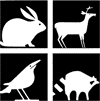Center, Internet, Wildlife Damage Management

Wildlife Damage Management Conference Proceedings
Date of this Version
October 2000
Document Type
Article
Abstract
In 1995, North Carolina Wildlife Resources Commission (NCWRC) established policy and rules for handling of nuisance wildlife by Wildlife Damage Control Agents (WDCA). The policy required a one-day long training session, culminating in an open book, certification examination. The North Carolina Cooperative Extension Service (NCCES) conducted the training and administered the examination. The certification-training program covered principles of wildlife damage management, wildlife laws and regulations, humane handling of animals and euthanasia, human health risks from exposure to wildlife, professional ethics, and sources of technical information. Between Octoberl995 and March 2000,7 certification-training sessions were held and 289 WDCA's were certified, with agents in 57 of 100 counties. The Wildlife Division of NCWRC administrated the program. WDCA's are entitled to issue Wildlife Depredation Permits to North Carolina residents suffering damage from native wildlife that are not specially protected by federal or state laws. The depredation permit provides for the listing of the issuing WDCA as a second party to the permit. While there is no charge for the permit, the WDCA can charge for removal of the animals and repair of structures. WDCA's must be re-certified every 3 years. The WDCA program was evaluated by surveying the first group of 47 agents, certified in 1995, when they completed their examinations for recertification in 1998. Additionally we surveyed wildlife enforcement officers, district wildlife biologists and their supervisors, and cooperative extension agents to gain their views of the WDCA program. No major problems were reported with program administration or training. The cooperative relationships among leading and supporting agencies were excellent. Increased effort at WDCA publicity, both locally and statewide were recommended. In 2000, the pamphlet, "The North Carolina Wildlife Damage Control Program" was written and published. The pamphlet was distributed to county extension centers, wildlife law enforcement officers, USDA-Wildlife Services staff, and NCWRC centers, wildlife law enforcement officers, USDA-Wildlife Services staff, and NCWRC wildlife biologists. NCWRC now lists all the WDCA who wish to work with the public on their website, http://www.wildlife.state.nc.us/. Extension agents have been encouraged to hold meetings of WDCA, Wildlife Law Enforcement Officers, and NCWRC biologists in their counties to encourage better communications.

